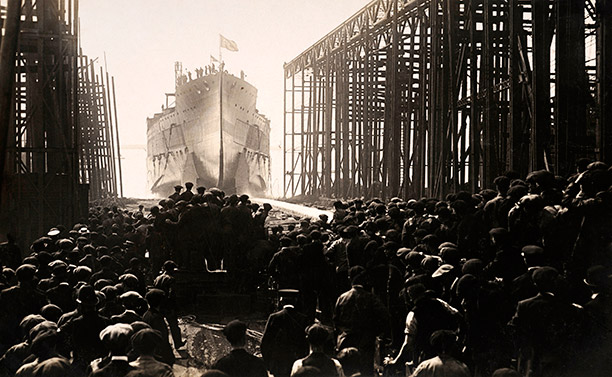The entry of Turkey into the First World War may
have extended the conflict by as much as two years. It certainly changed
the country forever. Yet the advent of war was marked by confusion,
uncertainty and shifting alliances, says Ian F.W. Beckett.
 The Turkish battleship Resadiye (later HMS Erin) is launched at Vickers' Works, Barrow in 1913One
of the star attractions of Vienna’s Heeresgeschichtliches (army
history) Museum is the motor car in which Archduke Franz Ferdinand was
assassinated in Sarajevo on June 28th, 1914. There is another car in the
equivalent Turkish Askeri Muze army museum in Istanbul, riddled with
bullet holes and, a trifle melodramatically, containing a wax dummy of
the victim, the Ottoman Grand Vizier (first minister), Mahmud Sevket
Pasha, who was assassinated by gunmen on June 11th, 1913. In its way
this was just as significant a murder as that of Franz Ferdinand. It is
by no means clear who killed Sevket. It may well have been opponents of
the Ittihad ve Terakki Cemiyeti (Committee of Union and Progress, or
CUP) that had dominated Turkish politics since the revolution of the
‘Young Turks’ in July 1908 and had increased its power by a military
coup in January 1913. On that occasion a group of 10 army officers had
stormed the previous grand vizier’s office, shooting dead the minister
of war and forcing the resignation of the Ottoman Cabinet. Sevket was
installed as the new grand vizier. While sympathetic towards the CUP,
Sevket had only loose connections to them and there were only three CUP
ministers in his government. The effect of his assassination, however,
was to consolidate the CUP’s influence. One of the CUP ministers, former
foreign minister Prince Mehmed Said Halim Pasha, replaced Sevket as
grand vizier and other prominent CUP figures joined the government for
the first time. Enver Ismail Pasha, who had led the attack on the grand
vizier’s office a year earlier, became the new minister of war in
January 1914.
The Turkish battleship Resadiye (later HMS Erin) is launched at Vickers' Works, Barrow in 1913One
of the star attractions of Vienna’s Heeresgeschichtliches (army
history) Museum is the motor car in which Archduke Franz Ferdinand was
assassinated in Sarajevo on June 28th, 1914. There is another car in the
equivalent Turkish Askeri Muze army museum in Istanbul, riddled with
bullet holes and, a trifle melodramatically, containing a wax dummy of
the victim, the Ottoman Grand Vizier (first minister), Mahmud Sevket
Pasha, who was assassinated by gunmen on June 11th, 1913. In its way
this was just as significant a murder as that of Franz Ferdinand. It is
by no means clear who killed Sevket. It may well have been opponents of
the Ittihad ve Terakki Cemiyeti (Committee of Union and Progress, or
CUP) that had dominated Turkish politics since the revolution of the
‘Young Turks’ in July 1908 and had increased its power by a military
coup in January 1913. On that occasion a group of 10 army officers had
stormed the previous grand vizier’s office, shooting dead the minister
of war and forcing the resignation of the Ottoman Cabinet. Sevket was
installed as the new grand vizier. While sympathetic towards the CUP,
Sevket had only loose connections to them and there were only three CUP
ministers in his government. The effect of his assassination, however,
was to consolidate the CUP’s influence. One of the CUP ministers, former
foreign minister Prince Mehmed Said Halim Pasha, replaced Sevket as
grand vizier and other prominent CUP figures joined the government for
the first time. Enver Ismail Pasha, who had led the attack on the grand
vizier’s office a year earlier, became the new minister of war in
January 1914.Enver would play a crucial role in bringing Turkey into the war. Both David Lloyd George and the German general Erich Ludendorff alike were to claim that Turkish entry prolonged the war by at least two years. In the short term it meant new theatres of military operations in the Dardanelles, Mesopotamia, Palestine and the Caucasus. In the longer term Turkish defeat saw the partition of the Middle East between Britain and France. The results, and the contradictory promises made during the war to Arabs and Jews, remain evident to this day. Imposition of the 1919 peace settlement helped forge the modern Turkish state, but led to the Greco-Turkish war of 1920-22, with its own enduring legacy of uprooted peoples and mutual hatreds. The war in the Caucasus also led directly to the genocide of the Armenian people, yet another lasting source of dispute in one of the world’s most turbulent regions.
Read the full text of this article in the May issue of History Today, which is out now, or get the digital edition for your iPad, Android tablet or Kindle Fire.
No comments:
Post a Comment